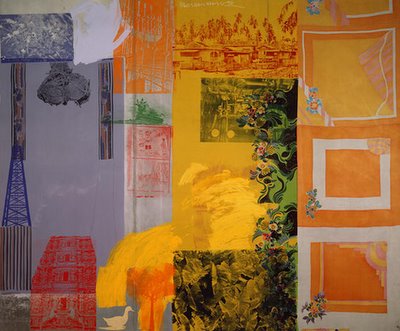Thursday, February 23, 2006

Another 7 1/2 hours in the office, another 1700 words written, this time on the subject of “Electronic Resources for Literature and Art,” which I will be lecturing about on March 1. I’m well versed on the topic of E-Literature (which does involve lots of media art, but here the charge is to showcase art sites, not electronic art sites—although some overlap certainly exists). In any case, the Art world, as it presents itself on the web, is somewhat new territory for me. So, I’ve had to spend a couple of days researching many sites, and reviewing their content. There is so much out there! I’m blown away by these sites that contain tens of thousands of images. Where to begin?? It’s all useful food, as far as I’m concerned—I’ve much enjoyed the crash course on virtual art histories, galleries, and the like. Great to find Rauschenberg’s "Malaysian Flower Cave" at the National Gallery’s archive (D.C.) which I’ve pasted above and as my laptop’s desktop. I’ll talk about some fairly standard resources but also about places like flickr—trying to keep it up to the minute and interesting. I found a few sites that I thought would be more potent than they were, one called the DADA server, and another titled “Algorithmic Image Gallery” (i.e., I thought I would like both more than I did, so may or may not mention them). Alternatively, I was surprised at how much I appreciated the ArtLEX Art Dictionary, which turned out to be a really useful hypertext. In general, the sites that were internationally focused were more appealing to me, although I still have great admiration for the Franklin Furnace site, which is an archive that I have known of since it started a few years back. When this presentation is complete, the URL for sites being introduced and discussed will be posted here…
Not much else to tell. Took care of some webserver housekeeping, distributed prototype cd-roms to colleagues here. The only other item of note—and this is from an entirely different aspect of my literary identity—is that I received a note from a fellow named Brandon Wallace (http://juliusspeaks.blogspot.com/), who was trying to get in touch with Amiri Baraka. From time-to-time I get emails for Baraka, as I organized his website and am listed as the webmaster. One day I actually hope to put together a small book called Emails to Baraka, because all sorts of letters have come in over the past 5 years, ranging from the most beautiful letters of praise and gratitude to the most hateful communications I have read anywhere. Anyway, Wallace’s interest had to do with something we’ve missed altogether here (until today), discussion of a recent book that lists of the 101 most worst university professors; BW was wondering what Ras and Amiri made of it, so I forwarded the message, then took a look at the list, which seemed (from afar) (& given all of the other things going on in the world) a bit ridiculous (although I will admit to having enjoyed reading the author's response to a professor who wanted to be on the list). Mainly, I wondered what has led him to pursue this agenda. Obviously, I haven’t spent any time with the book in question, and of course anyone is entitled to say whose ideas s/he doesn’t appreciate, but the schema in general (making Chomsky university enemy #1) is definitely peculiar (not to mention being world's away from the world I know). From what I read, the primary beef with those on the list is that they bring their own ideology into the classroom, but I’m not sure that this can be avoided by those involved with any sort of cultural studies. Well, obviously anyone can get a website and say whatever they want, but no one says anybody is required to read, believe in, or like what is posted! Ain’t that the truth!
<< Home

